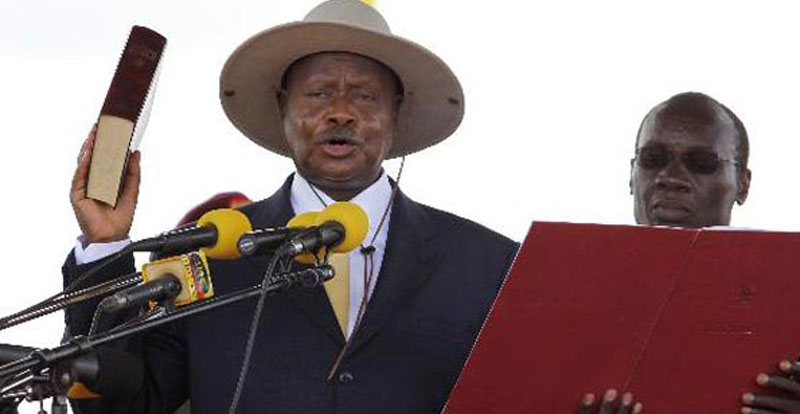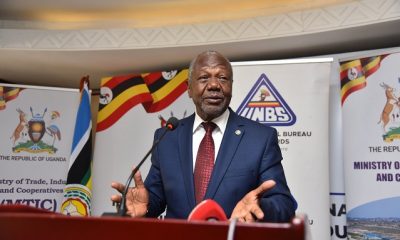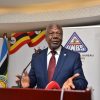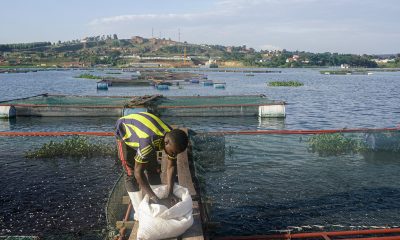Analysis
Joy and pain as Museveni takes 5th term
President Yoweri Museveni takes to the podium today Thursday 12th May 2016 to swear in for his 5th term that will prolong his stay at the helm of government to an unparalleled 35 years.
Museveni took power in 1986 following a five-year war he commanded against two regimes of Dr. Milton Obote and Gen. Tito Lutwa.
His Uganda Patriotic Movement (UPM) and other political parties had lost an election to the ruling Obote’s UPC in 1980 when Museveni took to the bush from where he emerged victorious in 1986.
Since then, Museveni has remained in power. He started by suspending political parties and embracing all political actors under what he called a Movement system.
After consolidating power and following lots of pressure from political parties and western donors, Museveni opened up the political space, allowing political parties to compete for power with him.
But Museveni’s long reign has brought intense criticism from within and outside the country as counter to the original ideals he stood for. As exemplified by the comments made the Head of Delegation of the European Union in Uganda Ambassador Kristian Schmidt, Museveni’s long stay threatens to reverse the gains recorded over the past 30 years.
Joy
Museveni has gone into history as one of the longest serving Presidents of Uganda.
Love it or hate it, Museveni’s regime has restored peace and order. Before Museveni happened to Uganda, all the country knew were misery and despair wrought upon it and its citizens by the murderous and irresponsible regimes of the day. Museveni has since seen off a number of rebellions and pacified the whole country.
Misery and despair was sparked off by the 1966 crisis that saw the gun taking absolute position in the governance of the country. What started as a simple row between Prime Minister Dr Milton Obote and his boss, President Freddie Muteesa II sparked off by a disagreement on the holding of the referendum for Banyoro in the lost counties to determine whether they wanted to stay under Buganda or return home, would later take fatal dimensions when the latter sent in armed forces commanded by Idi Amin to raid the former’s palace at Mengo.
Muteesa managed to flee capture and possible assassination, but the seed of the gun rule had been planted and the same would germinate when Amin, the man used by Obote to overrun Muteesa’s palace, overthrew his commander in chief (Obote) in 1971. Thereafter, coups became the order of the day with government after government being overthrown by the gun until up to the time Museveni took the stage.
When history is finally recorded it will paint Museveni in good colors as far as taming the army is concerned. Museveni has done wonderfully well where others before him failed in this regard.
Where soldiers used to harass citizens without the authority doing anything to tame them, the Ugandan army is now the point of reference for anyone doing research touching on the discipline of the military. So much so that Ugandans now find it a wonderful experience associating with the army than with the police that is supposed to be more pro-people and pro-active.
Economy
By the time Museveni took the reigns in Uganda, the country was importing almost everything. As a matter of fact, Nairobi had turned into the trading centre of Uganda. Dollars were hard to come by, prompting smart business people to hoard them and exchange them for the shilling at exorbitant cost.
Because everything was being imported with Uganda exporting almost nothing, Uganda was unable to earn anything from the world market yet it was buying anything from that market.
When Museveni came in, the economy has grown by several folds. Basic needs of life are in plenty supply never mind the rising cost of accessing them. The dollar is available and well regulated never mind the exchange rate at which it’s trading with the local shilling.
Inflation is standing at arguably normal digits now. The dollar market is well regulated and the same readily obtainable for businesspeople in need of it although it is still trading at unfavourable rates against the local shilling.
Investors are flocking into the country and to the countryside. They come along with dollars which they are pouring into our economy. Industries are being constructed here and there.
Oil has been discovered so are many minerals. Museveni is expectant now that the issue of the oil pipeline has been sorted out by all stakeholders that the oil dollars will start flowing in 2019, enhancing further our economy.
In short, the future of our economy looks brighter and can only get rosier as per evidence on the ground assuming other factors will remain unchanged.
The improved economic conditions coupled with liberalisation have empowered many people and generally lifted many people from poverty. Economic freedom has also triggered savings and investments by many locals in sectors such as education, health, trade, energy, agriculture among others contributing to increased output.
Governance
Unlike in the past when government didn’t take elections seriously and when one president ruled by decree as opposed to deriving power from the people through the ballot box, today elections are carried out periodically. But the quality of elections especially under Eng. Badru Kiggundu’s Electoral Commission continues to undermine this globally undertaking.
The people turn up to vote leaders of their choice never mind machinations such as bribery and intimidation that is employed by politicians to curtail that freedom.
All kinds of people from all walks of life, including comedians, boda boda riders, wheel barrow pushers and artists are exercising their right under the regime of Museveni to be elected into political offices. This is unprecedented. In the past, there were certain categories of people who were supposed to be leaders.
Cases of killing politicians and people basing on their political beliefs are not as rampant today as they were during the Obote II and Idi Amin regimes.
Today, Dr Kizza Besigye, for instance, declares a campaign of defiance against government, announce plans to establish a parallel government there in the open. And he goes home to sleep soundly without the fear of receiving mid night thugs.
Anxiety
While Museveni’s star appears to be glowing, there is a side to it that is increasingly turning darker and which he must be wary of as he embarks on his final lap of politics.
Pissed donors
Museveni knows the problems that come when donors (western powers) get angry with any President. It is partly because the donors had gotten angry with the regimes of Amin, Obote and Lutwa, that Museveni was able to get support from the whites which helped him to take power finally.
But, Museveni is now abusing the whites. He is telling them to mind the affairs of their country and leave the affairs of Uganda to him.
When the development partners counselled him to return the country to the democratic path of good governance and the rule of law, the president told them to leave him alone because it is not from them that he learned politics.
But donors haven’t taken the snub lying down. When Obote abused them over the apartheid regime in South Africa and even moved to the East, which Museveni has done already, they spoke to Amin who overthrew him.
Moving to the East
Seeing that the Whites could not stop nagging him to embrace their brand of democracy, Museveni got himself new friends in China, North Korea and Russia. These ones have good manners. They do not pester friends to respect democracy, human rights, among such ‘alien things’.
The new friends are the ones who are now getting handsome deals from Museveni. China is monopolizing the oil business, for instance. Russia is monopolizing the other lucrative business of selling arms to Uganda. North Korea is training our police.
By hooking up with China, Russia and North Korea, Museveni has put himself directly into the firing line of the western countries. He has become a pawn in the chess game otherwise known as the cold war.
It is not for nothing that the Western countries took keen interest in the just concluded elections and influenced the final outcome in order to tilt it in favour of someone they wanted to replace Museveni.
Their controlled and powerful media as well as election experts and observers poured into Uganda with only one assignment: to depict Museveni and his government as election thieves and hugely power-hungry lot capable of even maiming and killing opponents as an excuse for the world to get angry and expel the NRM from power.
The news that was written by the western media and reports made by election experts and international observers are such good pieces of evidence of the overriding goal of the Whites to take revenge against Museveni.
Defiance
Museveni has jailed, kept in incommunicado and shabbily treated Dr Kizza Besigye to scare him out of opposing his government, but the man can’t stop it yet.
On the contrary, Besigye is talking of forming a parallel government. But he was not speaking like that before. Where is he getting the guts to do so now? The answer lies in Museveni’s fall-out with the West. The West wants someone to take out Museveni and they see Besigye as such a courageous politician capable of doing their job. Besigye has radicalized many youth, who are ready to do what he tells them.
So Museveni will have a big hurdle in Besigye and his army of radicalized youth to handle during his fifth term.
Enough
Ugandans have learned to tell Museveni that he has ruled for long and that is enough. They want another person to come in and fix what Museveni has failed to fix.
The kind of resistance on the streets and elsewhere coupled with the voices of disapproval of Museveni’s policies and rule ringing out from many quarters, points to the fact that a good number of Ugandans want to see change.
Museveni himself knows it, the reason he has been amassing arms to fight off such increasing clamor for his power.
Comments



















